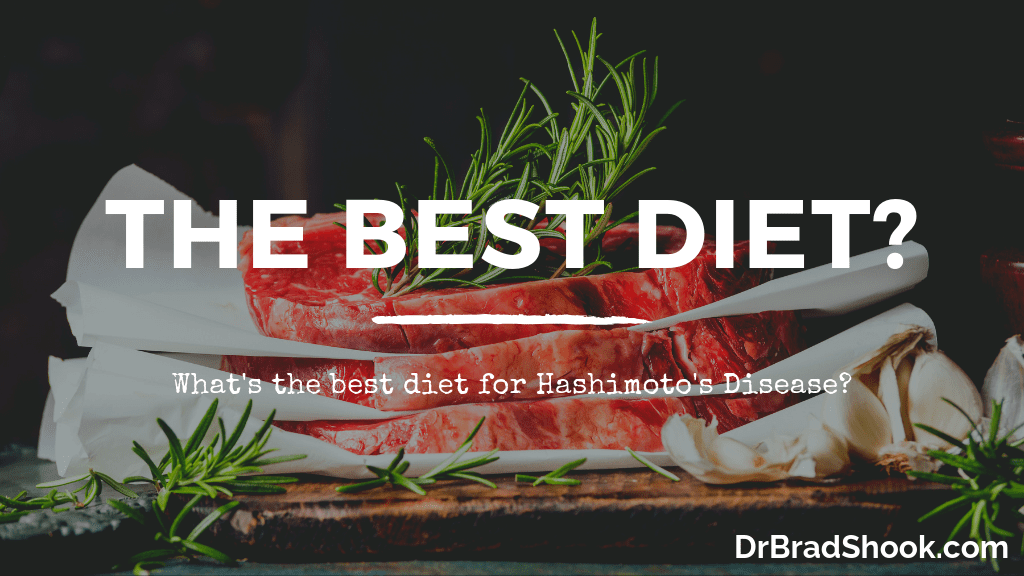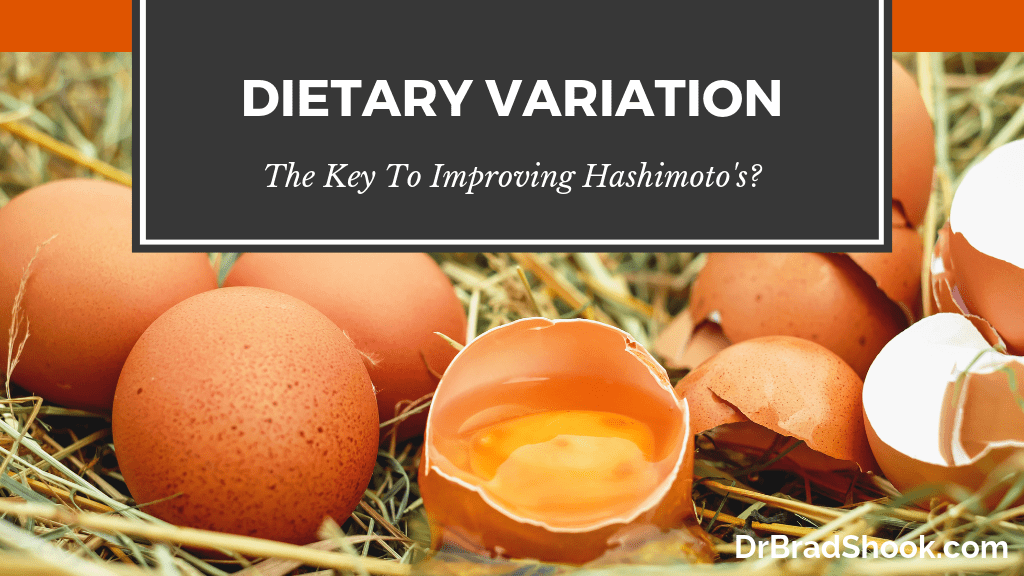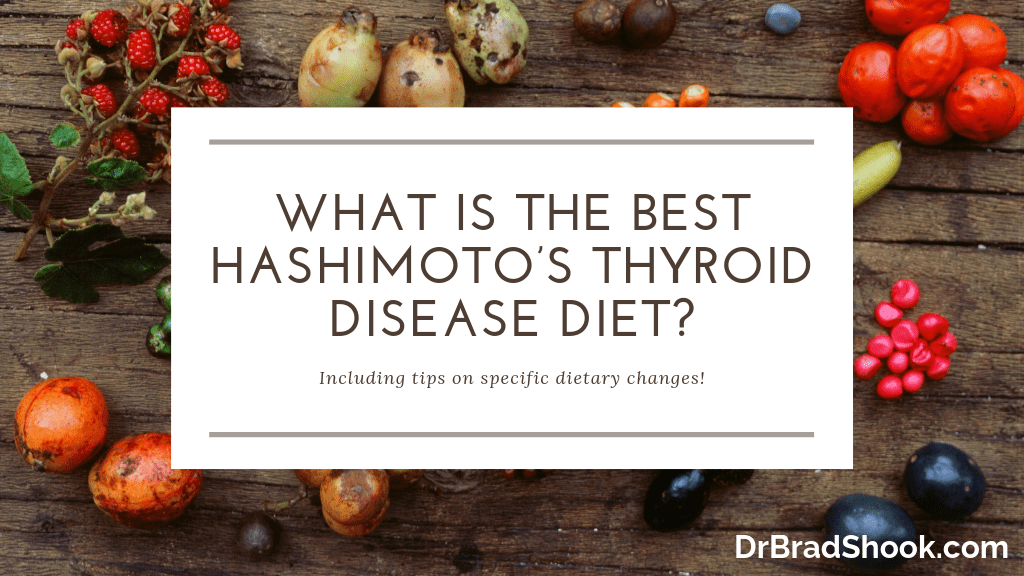What Is The Best Hashimoto’s Thyroid Disease Diet?
Updated by: Brad Shook, DC February 8th, 2023
Article Navigation
Article Navigation
Article Navigation
Confusion Around The Best Hashimoto Diet
Hashimoto Thyroiditis Diet and Leaky Gut Syndrome
The leading theory behind how foods trigger autoimmunity goes like this:
- The immune system reacts to partially digested food proteins called peptides. This is believed to be caused by intestinal permeability (a.k.a. “leaky gut”) and the “leaking” of these peptides into our bloodstream before they are thoroughly digested into their smallest parts, called amino acids. Amino acids are not immune reactive.
- The immune system identifies these peptides and makes antibodies against them. Antibodies are like tags that identify the food protein as foreign, and they mark it for destruction by other cells.
- The antibodies made against the partially digested food proteins, or peptides may be able to attach to some of the tissues of your body through a process called immunological cross-reactivity (antibodies stick to proteins other than those they were created bind with), due to molecular mimicry (similarity in shape of the protein in the tissues of your body’ to the protein, or peptide that has “leaked” into your bloodstream.... basically, they look very similar.
- Once these antibodies bind to your tissues, your immune system begins reacting to the tissues and destroying them. This is called loss of self tolerance, and is the autoimmune reaction.
It's important to remember that we are all genetically unique, and therefore will have different genetic expression based on the diet we eat.
Our diet is considered an environmental input that influences our gene expression, this is called an epigenetic expression, and this is different for everyone.
What's good for you is not necessarily what's good for someone else. Consider people with an ApoE4 genetic variation.
They are at a higher risk of Alzheimer's Disease (https://www.nia.nih.gov/health/alzheimers-disease-genetics-fact-sheet) and understanding the epigenetic factors that activate the expression of these genes is of great interest to researchers.
Our genetic uniqueness means that there is no one size fits all Hashimoto’s thyroid disease diet.
Researchers are studying the immunological factors believed to trigger and drive Hashimoto's disease.
Their research is focused on trying to determine the proteins in foods, pathogens (bacteria, fungi, parasites, viruses), and chemicals that have similar structure to human tissues, and that are likely to be mistaken by the immune system during an immune response.
The immune system produces antibodies (think sticky note) to stick to, and flag something foreign to the body for destruction by other immune system cells.
If the immune system is reacting to something, let's say a bacteria, that has a similar protein structure as your thyroid TPO or any other human tissue, the immune system may think the TPO or tissue is the bacteria becasue of the structural similarity of the bacteria and tissue proteins.
This similarity in protein structure is call molecular mimicry.
The actual process of binding, or sticking of antibodies that are made to attach to something foreign, like a bacteria, that mistakenly bind to human tissue is called cross-reactivity.
When researchers finally determine the foods, pathogens, and chemicals that cross-react with thyroid tissues, then we will have the closest things to a perfect Hashimoto’s thyroid disease diet.
I don't know about you, but I'm super excited about the possibility of having a very specific Hashimoto's thyroiditis diet.
The good news about this research, is that we can currently test food, pathogen and chemical reactivity, but this has to be done through laboratory testing that is not currently covered by insurance







Autoimmune diet is a healthy diet that is the best diet with healthful fats for chronic inflammation containing anti inflammatory foods. It supports chronic diseases and hashimoto's symptoms.
Hashimoto's Disease Diet Options
I get a lot of questions regarding what’s the best diet for Hashimoto's.
The most popular dietary plans I'm asked about include the following:
- Eliminating gluten, dairy, soy, and other foods alone or in combination
- Ketogenic diets
- Low carb diets
- Intermittent fasting
- Elimination diets
- Specific Carbohydrate Diet
- low-FODMAPs diet
- Fasting mimicking diet
- Low Lectin Diet
- Paleo Diet
- Autoimmune Paleo Diet (AIP)
- Detox Diets
- Elemental Diets
- The carnivore diet
- Juicing
- Low Iodine - Iodine Intake
- etc.
With this long list of diets and more being created every day, there is no wonder people are so confused. The reality is that there are a lot of diets that may help, but there is no perfect Hashimoto's thyroiditis diet.
I've had the opportunity to work with thousands of clients one-on-one, through group coaching, teaching, and by joining discussions in facebook groups with tens-of-thousands of people.
From my personal experience with autoimmunity, and after working with and observing so many peoples' successes and failures, several patterns started to emerge.
These patterns have helped me understand dietary, lifestyle, and nutritional supplementation strategies that tend to be beneficial and sustainable for people with Hashimoto's, Graves' Disease, and autoimmune conditions.
Hopefully, you will not have to make the same mistakes I did, and you can have a better starting point in your quest for health.







No fried foods, refined sugars, refined grains, the best diet for hashimoto's thyroiditis is full of unprocessed foods
Hashimoto's Thyroid Disease Diet Essential Changes
These are the fundamental aspects of the dietary changes that I’ve seen improve Hashimoto’s and thyroid physiology clinically.
The diet must:
- Decrease immunologically reactive food protein burden
- Balance blood sugar
- Improve vitamin and mineral status
- Improve essential fatty acid status (EFA, Omega 3:6 ratio)
- Improve digestion, especially intestinal permeability (aka leaky gut)
- Grain-free, Gluten Free diet, especially those people who are gluten sensitive and that have celiac disease
- Contain meat, and animal protein, In my experience, consuming animal protein is usually necessary, but if you work with a specialist on vegan diets, you may be able to accomplish similar results following a vegan diet.
- Whole foods based, nutrient dense diet
- No processed foods
- Lots of vegetables
- Low to moderate fruit
- Typically are not low carbohydrate
- Sweet potatoes are great choices
- Contain Healthy Fats
- Olive Oil
- Coconut Oil
- Polyunsaturated fats and monounsaturated fats too
- Contain cruciferous vegetables
- Brussels sprouts
- Cabbage
- Broccoli
- Contains Fermented Foods
- A balanced diet with adequate protein, carbohydrates, and healthy fats
- Typically anti inflammatory, grain free diet,







Certain foods support healthy thyroid and thyroid hormone levels and increase raising low vitamin D levels in people with hashimoto's thyroiditis
Hashimoto's Disease Dietary Individualization
Individual dietary variations to best support hashimoto's disease that need to be considered:
- Frequency of eating is very important for the stabilization of blood sugar, so basically eat as much as you need to stabilize blood sugar. I find that eating at least every three hours is essential to stable blood sugar, though some people do well on a vegetable-rich ketogenic diet.
- Adding or eliminating plant-based fibers depends on the diet you have been following. In contrast to what I observed five years ago, many people today are orthorexic, meaning they are obsessed with proper or healthy eating. For our purposes, orthorexia refers to eliminating too many foods from the diet, resulting in loss of diversity in plant-based fibers being consumed.
- Limiting fish high in mercury. Mercury has a 60 day half-life, meaning it takes 70 days to clear half of the mercury you eat. Eating a lot of fish, especially fish high in mercury may be problematic. The Environmental Working Group’s “EWG’s Consumer Guide To Seafood” is a great resource I highly recommend.
- Limiting foods high in iodine. Numerous population studies have demonstrated increases in autoimmune thyroid disease with iodization of the food supply. Iodine is not bad for you, it’s actually essential for normal thyroid function. I almost always recommend lower doses of iodine around 225 mcg per day, but only in combination with selenium and other antioxidants. With increased T4 production there is an increase in hydrogen peroxide that needs to be reduced by the selenium dependent antioxidant glutathione, so you don’t want to be selenium deficient. *Do not take too much selenium, it can be very toxic.
The dietary approaches I most commonly recommend for Hashimoto's:
- Gluten and dairy-free diet
- Paleo
- Autoimmune Paleo Diet (AIP)
- Ketogenic Diet
- Ketogenic Diet with diverse vegetable intake
After seeing these patterns clinically and in the Greater Hickory Thyroid Support Group, I decided to create a dietary plan that teaches you precisely what to do, rather than guessing with a random diet that hasn’t been clinically validated.
In my dietary program I decided to incorporate a simple, clinically validated 2-week meal plan that is designed to be repeated, that includes recipes and shopping lists, plus I teach the lifestyle recommendations and temporary nutritional supplementation I’ve seen help people make the most improvement with their health.
I hope this information helps you to become an active participant in your healthcare and a better partner with your healthcare provider.
It’s my mission to change one person’s life at a time, if I can do that, it will make a positive impact on your family, community, and ultimately the world.If you have any questions, or if there is anything that I can do for you please let me know.
Dr. Shook's Livestream on The Best Hashimoto’s Thyroid Disease Diet
FAQs


Diet can support autoimmune diseases like Hashimoto's and GI conditions like irritable bowel syndrome
What is the best diet for someone with Hashimoto's?
It is advisable to eat a balanced diet that consists of healthy fats and lean protein and some carbohydrates. Hashimoto sufferers experiment with various diet options until they find the option that works best for them. We typically see that an autoimmune protocol diet like the one Dr. Shook created and uses with most of his clients tends to work well.
Best Foods for Hashimoto's Disease
The best diets for Hashimoto’s are rich and unprocessed, containing high fiber foods and healthy fats. Many people with Hashimoto's experiment with different foods until they get to what feels most comfortable. All these are characterized by whole, non-processed foods.
Balancing Blood Sugar By Limiting the Intake of Carbohydrates is Important
You may be surprised when you discover that carbohydrates are not essential in your diet. One of the main focuses of an autoimmune dietary protocol is to stabilize blood sugar. Blood sugar imbalances can cause stress, fatigue, anxiety, elevate cortisol and cause problems for your hormones and immune system function.
Gluten and Grain Free Diets
In some studies, people who have hashimoto are at higher risk for celiac disease. In other words, experts recommend that all Hashimoto patients be tested for celiac disease. Some research indicates dietary changes may help those suffering from Hashimoto's thyroiditis.
Can you fix Hashimoto's with diet?
In the case of Hashimoto, it is an autoimmune condition for which there is no cure. An autoimmune paleo diet is very important, and some diets like the carnivore, and paleo diet have also helped people, likely becasue they are a form of elimination diet. These diets are all gluten free, eliminate processed foods, and encourage eating foods that are nutrient dense, with lots of healthy fats. This type of autoimmune protocol diet and lifestyle changes helps reduce inflammation, stops weight gain, helps the thyroid gland heal, and may improve thyroid function in people with hashimoto's.
What are the best healthy fats to eat if you have hashimoto's disease?
The best healthy fats to eat if you have Hashimoto's disease are omega-3 fatty acids, monounsaturated fats (such as olive oil and avocado), and coconut oil. These healthy fats provide essential nutrients and help reduce inflammation, which is beneficial for those with Hashimoto's disease. Additionally, they can help support thyroid health.
Will an anti inflammatory diet and lifestyle changes help my thyroid gland work better if I have hashimoto's disease?
Maybe, everyone is different. An anti-inflammatory diet and lifestyle changes can help support the thyroid gland when you have Hashimoto's disease. Foods rich in omega-3 fatty acids, such as wild-caught fish, flax seeds, and walnuts, are known to be beneficial for regulating inflammation. Additionally, reducing stress through regular exercise and relaxation techniques can help balance hormones associated with the thyroid gland. Taking steps to follow an anti-inflammatory diet and lifestyle can help the thyroid gland to work better in people with Hashimoto's disease.
Is going on a gluten free diet enough to improve thyroid function if I have hashimoto's disease?
No, going on a gluten free diet alone is not enough to improve thyroid function if you have Hashimoto's Disease. Hashimoto's Disease is an autoimmune disorder, which means it is caused by the body’s immune system attacking the thyroid gland. Therefore, a comprehensive treatment plan may be necessary in order to manage and improve thyroid function. This could include medication, dietary changes such as reducing gluten intake, lifestyle changes such as stress management and regular exercise, and nutritional supplements. It is important to work closely with your doctor to develop an effective treatment plan for your particular situation.
What worsens Hashimoto's?
Too much iodine can cause Hashimoto's to become exacerbated.
Limiting Foods High in Iodine
Besides promoting thyroid function, iodine can aggravate hashimotos. Currently the prevalence of iodized salt has been regarded as a risk factor for Hashimoto's disease. Some studies have shown diets containing low Iodine reduce autoimmune symptoms and normalize thyroid function for individuals suffering from thyroid disease.
About the Author:
Dr. Shook has psoriasis and Hashimoto's disease and has trained extensively in functional medicine, epigenetics, and human performance optimization. DrBradShook.com is a resource to help people with Hashimoto's disease, thyroid dysfunction, and other autoimmune conditions learn more about how they can complement their current medical care and support their thyroid and autoimmunity naturally.













